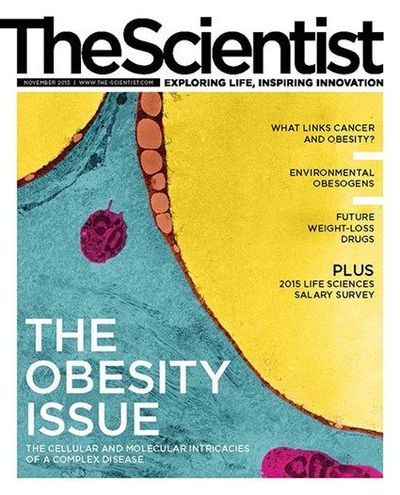 FEEDING INFLAMMATION: When mice eat a diet high in fat, their CD4 T cells show increased expression of the fatty acid biosynthesis gene Acaca, which encodes the enzyme ACC1 (1). Products of the ACC1 fatty acid synthesis pathway encourage the transcription factor RORγt to bind near the gene encoding the cytokine IL-17A (2). There, RORγt recruits an enzyme called p300 to modify the genome epigenetically and turn on IL-17A. The memory T cells then differentiate into inflammatory T helper 17 cells.
FEEDING INFLAMMATION: When mice eat a diet high in fat, their CD4 T cells show increased expression of the fatty acid biosynthesis gene Acaca, which encodes the enzyme ACC1 (1). Products of the ACC1 fatty acid synthesis pathway encourage the transcription factor RORγt to bind near the gene encoding the cytokine IL-17A (2). There, RORγt recruits an enzyme called p300 to modify the genome epigenetically and turn on IL-17A. The memory T cells then differentiate into inflammatory T helper 17 cells.
See full infographic: PDF© STEVE GRAEPEL
EDITOR'S CHOICE IN IMMUNOLOGY
The paper
Y. Endo et al., “Obesity drives Th17 cell differentiation by inducing the lipid metabolic kinase, ACC1,” Cell Reports, 12:1042-55, 2015.
Obesity often comes with a side of chronic inflammation, causing inflammatory chemicals and immune cells to flood adipose tissue, the hypothalamus, the liver, and other areas of the body. Inflammation is a big part of...
To better understand the relationship between obesity and inflammation, Toshinori Nakayama, Yusuke Endo, and their colleagues at Chiba University in Japan started with what often leads to obesity: a high-fat diet. They fed mice rich meals for a couple of months and looked at how gene expression in the animals’ T cells compared to gene expression in the T cells of mice fed a normal diet. Most notably, they found increased expression of Acaca, a gene that codes for a fatty acid synthesis enzyme called acetyl coA carboxylase 1 (ACC1). They went on to show that the resulting increase in fatty acid levels pushed CD4 T cells to differentiate into inflammatory T helper 17 (Th17) cells.
Th17 cells help fight off invading fungi and some bacteria. But these immune cells can also spin out of control in autoimmune diseases such as multiple sclerosis. Nakayama’s team showed that either blocking ACC1 activity with a drug called TOFA or deleting a key portion of Acaca in mouse CD4 T cells reduced the generation of pathologic Th17 cells. Overexpressing Acaca increased Th17-cell generation.
The researchers also demonstrated that mice fed a high-fat diet had elevated susceptibility to a multiple sclerosis–like disease, and that TOFA reduced the symptoms.
“This is a very intriguing finding, suggesting not only that obesity can directly induce Th17 differentiation but also indicating that pharmacologic targeting of fatty acid synthesis may help to interfere with obesity-associated inflammation,” Tim Sparwasser of the Twincore Center for Experimental and Clinical Infection Research in Hannover, Germany, says in an email. Sparwasser and his colleagues had previously shown that ACC1 is required for the differentiation of Th17 cells in mice and humans.
Nakayama explains that CD4 T cells must undergo profound metabolic changes as they mature and differentiate. “The intracellular metabolites, including fatty acids, are essential for cell proliferation and cell growth,” he says in an email. When fatty acid levels in T cells increase, the cells are activated and begin to proliferate.
“It’s a nice illustration of how, really, immune response is so highly connected to the metabolic state of the cell,” says Gökhan S. Hotamisligil of Harvard University’s T.H. Chan School of Public Health who was not involved in the study. “The immune system launches its responses commensurate with the sources of nutrients and energy from the environment,” he adds in an email.
There are still missing pieces in the path from high-fat diet to increased Acaca expression to ACC1’s influence on T-cell differentiation. It also remains to be seen how this plays out in obese humans, although Nakayama and colleagues did show that inhibiting ACC1 reduced pathologic Th17 generation in human immune cell cultures, and that the T cells of obese humans contain elevated levels of ACC1 and show signs of increased differentiation into Th17 cells.
Interested in reading more?




